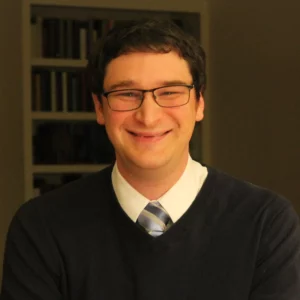Constitutional Studies Program
Study key constitutional questions and controversies with leading legal experts & practitioners.
July 20–24, 2026
Washington, DC
In the sixth week of Political Studies, fellows will turn to contemporary issues of domestic policy, with a focus on understanding how ideas influence policy.
One seminar, led by Charles Fain Lehman of the Manhattan Institute, introduces fellows to the key approaches and debates of twentieth-century conservative social science through four major policy arenas: family structure, poverty, welfare, and crime.
The second seminar, led by Patrick Brown of the Ethics and Public Policy Center, explores the reciprocal relationship between family and politics—how public policies influence family life and, in turn, how families sustain or challenge the political order.
Charles Fain Lehman on Social Policy at PSP
This course is part of our residential Political Studies Program. Fellows participate in morning seminars and meet prominent men and women in public life over afternoon and evening sessions. Up to 32 fellows will be selected.

Charles Fain Lehman is a fellow at the Manhattan Institute, working primarily on the Policing and Public Safety Initiative, and a contributing editor of City Journal. His work on criminal justice, immigration, and social issues has appeared in the Wall Street Journal and Tablet, among other publications.

Charles Fain Lehman is a fellow at the Manhattan Institute, working primarily on the Policing and Public Safety Initiative, and a contributing editor of City Journal. He also hosts the podcast Institutionalized with cohost Aaron Sibarium.
Lehman was previously a staff writer with the Washington Free Beacon, where he covered domestic policy from a data-driven perspective. His work on criminal justice, immigration, and social issues has appeared in the Wall Street Journal, National Review Online, and Tablet, among other publications, and he is a contributing writer with the Institute for Family Studies. Originally from Pittsburgh, he now lives in the Maryland suburbs of Washington, D.C.

Patrick T. Brown is a fellow at the Ethics and Public Policy Center, where his work focuses on developing a robust pro-family economic agenda and supporting families as the cornerstone of a healthy and flourishing society. Prior to joining EPPC, Patrick served as a Senior Policy Advisor to Congress’ Joint Economic Committee (JEC).

Patrick T. Brown is a fellow at the Ethics and Public Policy Center, where his work focuses on developing a robust pro-family economic agenda and supporting families as the cornerstone of a healthy and flourishing society.
His writing has been published in The New York Times, National Review, Politico, The Washington Post, and USA Today, and he has spoken on college campuses and Capitol Hill on topics from welfare reform to child care and education policy.
He has published reports on paid leave and family policy with the Institute for Family Studies, and edited an essay series featuring working-class voices for American Compass. He is an advisory board member of Humanity Forward and the Center on Child and Family Policy, and a contributing editor to Public Discourse.
Prior to joining EPPC, Patrick served as a Senior Policy Advisor to Congress’ Joint Economic Committee (JEC). There, he helped lead research about how to make it more affordable to raise a family and more effectively invest in youth and young adults. He also previously worked a government relations staffer for Catholic Charities USA.
Patrick graduated from the University of Notre Dame with a degree in political science and economics. He also holds a Master’s in Public Affairs from Princeton University’s Woodrow Wilson School of Public and International Affairs. He and his wife Jessica have three young children and live in Columbia, S.C.
Readings:
Discussion Questions:
Readings:
Discussion Questions:
Readings:
Discussion Questions:
Readings:
Discussion Questions:
Readings:
Discussion Questions:
Judge Roy Altman
Judge Roy K. Altman, at 36, became the youngest federal district court judge in the country—and the youngest federal judge ever appointed in the Southern District of Florida. He received his BA from Columbia University and his JD from Yale Law School, where he was projects editor of the Yale Law Journal. After law school, Altman clerked on the 11th Circuit Court of Appeals for the Honorable Stanley Marcus.

Patrick Coleman
Patrick Coleman is a Tutor at St. John’s College. He earned his Ph.D. in Physics from University of Illinois, Urbana-Champaign, with a dissertation on synchronization, and his B.S. in Physics from William & Mary College along with a minor in Philosophy. He is currently leading a research group on the integration of a Technology and Computation segment in St. John’s College’s Graduate Institute. Patrick has led seminars and reading groups for The Catherine Project, including a recent reading group on Richard Feynman’s Lectures on Computation, and is especially devoted to deepening scientific literacy.

Greg Weiner
Greg Weiner is President of Assumption University and founding director of the Daniel Patrick Moynihan Center for Scholarship and Statesmanship. He is the author of American Burke: The Uncommon Liberalism of Daniel Patrick Moynihan and Old Whigs: Burke, Lincoln and the Politics of Prudence.

Matthew Continetti
Matthew Continetti is the director of domestic policy studies and the inaugural Patrick and Charlene Neal Chair in American Prosperity at the American Enterprise Institute (AEI), where his work is focused on American political thought and history, with a particular focus on the development of the Republican Party and the American conservative movement in the 20th century.

Daniel DiSalvo
Daniel DiSalvo is a Senior Fellow at the Manhattan Institute’s Center for State and Local Leadership and an Assistant Professor of Political Science at The City College of New York-CUNY. His scholarship focuses on American political parties, elections, labor unions, state government, and public policy.

Adam J. White
Adam J. White is the Laurence H. Silberman Chair in Constitutional Governance and senior fellow at the American Enterprise Institute, where he focuses on the Supreme Court and the administrative state. Concurrently, he codirects the Antonin Scalia Law School’s C. Boyden Gray Center for the Study of the Administrative State.